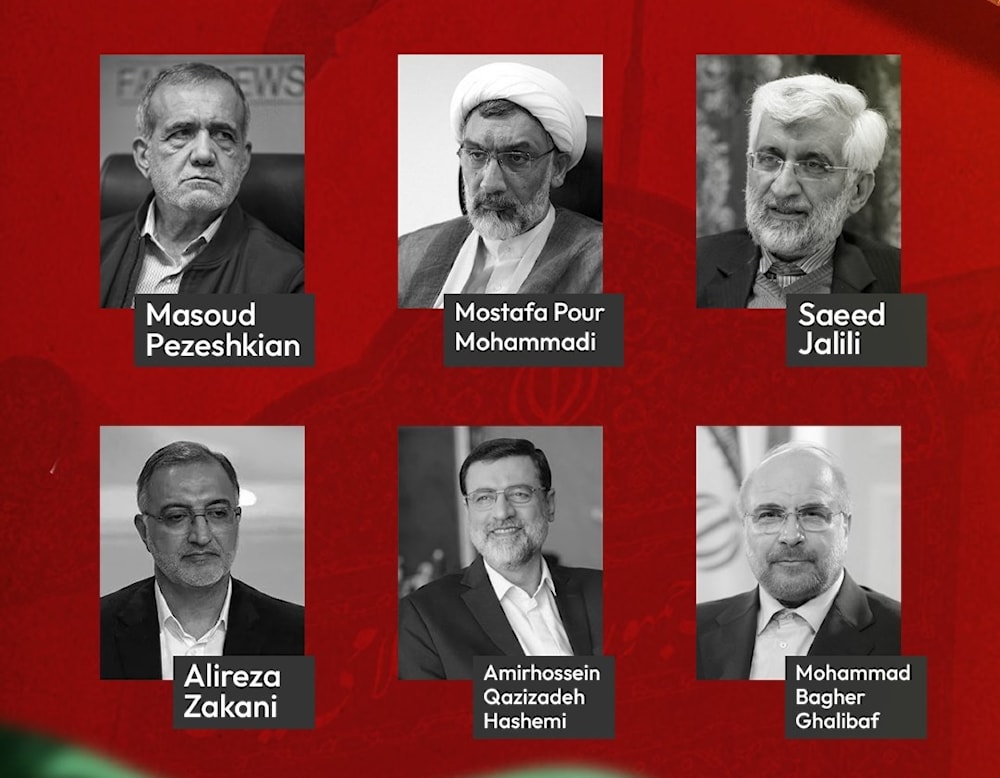Iran presidential candidates touch on combatting poverty in 2nd debate
Iran's six presidential candidates present their views on solving economic and social issues.
-

The six candidates for the 14th Iranian presidential election
The six candidates for the 14th Iranian presidential election held Thursday evening their second live debate, discussing their plans to support Iranian citizens and combat poverty.
Qazizadeh Hashemi
Amirhossein Qazizadeh Hashemi stressed that poverty must not take root, saying, "We must look at its causes and support those who cannot sustain themselves."
"Unfortunately, we did not fare well in the 2010s, with economic growth close to zero, resulting in a 30 percent reduction in the Iranian household budget," he said.
He highlighted that today, 30% of Iranians earn less than 12 million rials and need assistance, and therefore, "the fundamental action is to develop employment and ensure at least one family member is employed."
Qazizadeh Hashemi has two main plans: the first is to return assets that inherently belong to the people but are currently under government control back to the people, and the second is to reform the mechanisms outlined in the Targeted Subsidies Plan, which have been poorly implemented.
Bagher Qalibaf
Mohammad Bagher Qalibaf underlined that "justice and the prevention of discrimination, especially concerning public assets, must be prioritized. There can be no reason or excuse to overlook justice.."
He emphasized that Iranian people have the right to "a good life, not an ordinary one," pointing out that Iran's future president must guarantee that this issue is resolved.
The current speaker of the Iranian Parliament added that it is the direct responsibility of the president to maintain the purchasing power of households.
He stated that the government should not allow a person who has worked all their life to become poor upon retirement and ensure the labor share in production does not decrease.
According to Qalibaf, the government should strive to increase the wages of those with fixed incomes in line with growth and inflation rates either through cash compensation or essential goods, ensuring that each person has access to 2,100 calories per day and providing six essential items for marriage dowries.
Pour Mohammadi
Candidate Mostafa Pour Mohammadi emphasized that providing services and ensuring justice is a fundamental issue for all governments.
However, according to Pour Mohammadi, in the past two decades, justice has not been adequately observed, leading to the enrichment of a small group of people, the shrinking of the middle class, and increased poverty among the lower classes.
He added that anyone aiming to implement fundamental reforms must thoroughly understand the administrative system of the country.
The candidate pointed out that the country still faces gaps in its administrative system inherited from the Western-backed Mohammad Reza Pahlavi's era, which needs to be reformed.
"Consensus and unity cannot be achieved by slogans alone. When cliques, groups, and sidelines dominate any sector, it creates social distance," Pour Mohammadi explained, adding that "behavior towards intellectuals, professors, teachers, and the public needs to change."
Pour Mohammadi also stressed that it is essential to establish new, effective mechanisms to combat corruption, which will restore hope to the people and strengthen mutual trust.
Pezeshkian
Candidate Masoud Pezeshkian emphasized that the issue lies in not implementing the general policies advocated by the Iranian leader and leader of the Islamic Revolution, Sayyed Ali Khamenei.
He said that he has been advocating for the rights of the underprivileged for years and will continue to do so whether he becomes president or parliamentary deputy.
Pezeshkian pointed out that the real problem is in the execution of laws, not in the laws and plans themselves.
Jalili
Candidate Saeed Jalili highlighted that "there are abundant global opportunities for the country's progress," urging the need to avoid procrastination and tie several of the country's issues together.
Domestically, Jalili explained that the president has specific tasks, the most important of which are to work on achieving justice in wealth distribution and providing a healthy and decent life for citizens.
He underlined that Iran is at a critical juncture, and every Iranian has an important role in determining the country's future through its participation in the decision-making process.
Zakani
Candidate Alireza Zakani argued that Iran has abundant resources, but their distribution is flawed.
During the debate, he lambasted his opponent Pezeshkian, who he said criticized late President Ebrahim Raisi's government three times but did not take responsibility when he was a minister and deputy in previous governments.
Zakani accused Pezeshkian of aiming to restore the dark period the country experienced during the 8-year Rouhani administration, which destroyed Iran's economy and exhausted the people.
It is noteworthy that the 14th presidential election in Iran is scheduled for June 28.
Read more: Iranian presidential candidates outline diverse programs, priorities

 5 Min Read
5 Min Read








